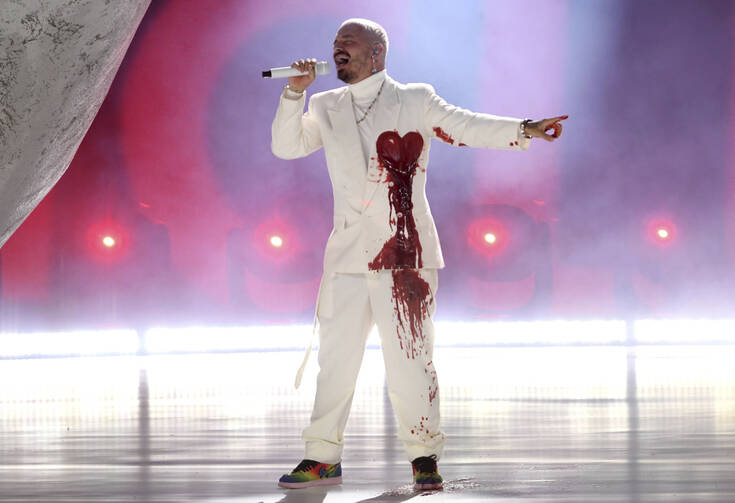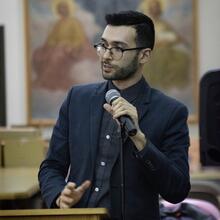I first heard the infectious dembow rhythm that undergirds every reggaeton song at my eighth-grade back-to-school dance. A mosh pit of suburban teens was trying in earnest to move their hips to the beat while mumbling the few words they could recognize thanks to obligatory Spanish classes. But when the chorus hit, everyone shouted without faltering, “¡Dame más gasolina!”
It was 2005, and Daddy Yankee’s international hit “Gasolina”had crossed over from the Latin music scene onto U.S. mainstream charts. I was captivated by the new sound: reggaeton. Though reminiscent of hip-hop and dancehall, there was something distinctive about dembow. It unleashed a passion and exhilaration within me in a way other sounds hadn’t before.
My attraction to reggaeton gave way to an historical and interior journey. The music speaks to me of God, in part because it awakened in me the tensions and longings of simply being human. But also because reggaeton itself, as it has developed over the years, began to speak of God.
Reggaeton uproots us from our complacency, reminds us that we are grasping for something elusive.
The origins of reggaeton are difficult to delineate. Scholars have attempted to map its socio-cultural roots and implications (for example, anthologies like the 2009 Reggaeton and the 2015 Remixing Reggaeton), but the most extensive work on the sound has been done by Wayne Marshall—an ethnomusicologist based at Harvard.
Marshall points to the genre’s deeper roots in African diasporic rhythms and drum patterns, but traces its most immediate roots to Jamaican dancehall (an offshoot of reggae), noting tinges of hip-hop, salsa and bomba y plena. In the late ’80s, Spanish-speaking (mostly Panamanian) artists joined with Jamaican producers in New York City to make Spanish versions of popular dancehall songs—which came to be known as reggae en español.
These early Spanish remakes retained the typical dancehall riddims, or drum patterns, until Jamaican artist Shabba Ranks’ 1990 song “Dem Bow” was released. It introduced what Marshall identifies as the “pounder” rhythm, a variation of the dancehall beat pattern. The song’s title is a patois rendering of the phrase “they bow”—a double-edged condemnation of those who bow to white colonial powers, as well as gay men who “bow down” for sex. “Deviant” sexual practices were deemed an import of morally decadent white colonizers and were especially demonized in Christian and Rastafarian communities.
However, Spanish remakes of the song by El General and Nando Boom shifted toward partying, dancing and making money. As the dembow beat pattern gained popularity, the term lost its anti-imperialist, anti-gay connotations. This sound spread in the Nuyorican community, eventually giving way to the renowned 1992 “Playero 37”mixtape.
The music speaks to me of God, in part because it awakened in me the tensions and longings of simply being human.
The dembow made its way from New York down to Puerto Rico, where young Puerto Rican acts experimented with the newly dubbed “underground,” “música negra” or “melaza (molasses)” genre. This would not come to be known as “reggaeton” until the early 2000s. It was 2004 when reggaeton first received international recognition, thanks to the release of Daddy Yankee’s “Gasolina” and N.O.R.E.’s “Oye Mi Canto.”
As reggaeton’s production values shifted further toward a markedly commercial quality, it became known lyrically for its joyride focus on partying, drugs, sexual inhibition and a machista attitude toward women (aside from Puerto Rican artist Ivy Queen, women were largely absent from mainstream reggaeton). On occasion, these decadent sexual pursuits border on the fantastic. Romeo Santos, singing on Wisin y Yandel’s “Noche de Sexo,” claims that during an all-night sexual escapade, he will “devour” his partner while “fulfilling” all her fantasies.
Some may look down on how reggaeton valorizes toughness and sexual power over vulnerability and emotional transparency. But on an existential level, the bravado and sexual prowess can be said to conceal a longing—a hope for something beyond what we can see. Others might argue that although reggaeton shifted further from the socially critical tone of dancehall, its machista themes speak to colonized people’s attempts to seize agency back from imperial powers.
Reggaeton was born in a culture quite different from my own. My experience as a Mediterranean-American male growing up in suburbia hinders me from fully appreciating the experiences of those who make the music that so attracted me. I began exploring the genre’s origins and appreciating the distinct cultural experiences that gave rise to the music, so as not to simply exoticize it.
On an existential level, the bravado and sexual prowess can be said to conceal a longing—a hope for something beyond what we can see.
Reggaeton’s popularization also faced criticism for blanqueamiento—“whitening.” As it became more popular in mainstream culture, the genre was becoming further removed from its distinctively Black roots, and non-Black artists seemed to forget who originally developed the sounds that they were cashing in on. This critique was amplified when major corporations like Optimum cable appropriated reggaeton in their commercials.
Reggaeton’s initial popularity died down toward the end of the 2000s, but a new breed of reggaetoneros emerged soon after, revved up to revive the dembow rhythm. With the newly minted term “musica urbana,” this upcoming class of artists globalized the sound. Combining the genre’s dancehall roots with American trap, Afrobeats and European dance rhythms—and embracing more introspection and emotional transparency—artists like J. Balvin, Ozuna and Bad Bunny gave reggaeton a facelift.
The ever-present motifs of sex and partying remained, but the self-assuredness of bravado and sexual prowess were dropped—for honest reflections on vulnerability, longing and spirituality.
Playing with avant-garde designer clothing and often changing the color of his hair, J. Balvin’s public image doesn’t exactly fit the hardened facade of reggaetoneros that preceded him. Hailing from Medellín, Colombia, he reached international audiences with his hit “Mi Gente,” a global anthem featuring the French-born Jamaican artist Willy Williams that celebrates international unity while giving props to Balvin’s Latin American roots.
Balvin’s Instagram posts frequently allude to spiritual seeking and what he calls “vibras,” or “good vibes.” For Balvin, the universal language of music transcends boundaries. He wants reggaeton music to reach global heights, “even [if people] don’t understand what I’m saying,” and for the entire world to appreciate Latino culture.
Puerto Rican-Dominican artist Ozuna rose to fame not too long after Balvin with popular songs like “Dile Que Tú Me Quieres.” His debut album “Odisea” (“Odyssey”) presents his artistry as a spiritual journey; the songs explore themes of innocence, fragility and desire. “What will become of me?” he asks in the album’s title track. But he trusts that God has sent him “on a mission,” and this quells his fear.
The self-assuredness of bravado and sexual prowess were dropped—for honest reflections on vulnerability, longing and spirituality.
On songs like “El Farsante” and “Una Flor,” he recognizes the fragility of human love, laments his failed attempts to love selflessly and promises with God’s help to amend his ways. A married man and father, Ozuna has committed to stop degrading women in his songs and videos. His songs about women now present them as deserving of commitment and respect, always willing to admit his mistakes and the ways he may have hurt them.
Ozuna often shares Bible passages on Instagram and once posted that he has “been all around the world and can tell you that no one can fill your heart like God can.” In an interview prior to the release of Aura, he said, “I want to reach people’s hearts with the word of God—this is my greatest goal, the greatest mission of my career.”
The public image of musica urbana’s latest international breakout star, Bad Bunny, is riddled with paradoxes. He fuses hypersexual machismo with gender-bending fashion statements (painted nails, and dressing in drag for his video “Yo Perreo Sola”). The themes of his songs oscillate from celebrating scandalously outrageous sexual acts (“Safaera”) and the pleasures of wealth and partying (“Estamos Bien”), to denouncing transphobic violence (“Solo de Mí”) and acknowleding his own existential confusion (“RLNDT,” “Ni Bien, Ni Mal”). The obscure symbolism he uses in his social media posts and his “Nueva Religión” movement—“new religion,” a fusion of seemingly irreconcilable values—makes him an anomaly amongst both current and past reggaetoneros.
Reggaeton’s horizons keep on expanding. Nicky Jam’s Telemundo TV series features his rise, fall and return to fame after struggling with drug addiction and reconciling fraught family relationships. Musica urbana has thankfully made more room for female artists like Natti Natasha, Karol G, Becky G and Spaniard Rosalía, who combines flamenco music with reggaeton and hip-hop beats.
The dembow’s tension pierces me, reminds my heart that it longs for something the song itself cannot fulfill. I listen and cry out to God: Come, reveal what’s missing.
What does this change in image, content and outlook mean for the future of reggaeton? The dembow sound’s global expansion has also led to its appropriation by non-Latino artists like Ed Sheeran (“Shape of You”) and Justin Bieber (“Sorry”). Does its newfound global outlook signify it is being watered down to cater to corporate expectations?
Tracing the spiritual trajectory of reggaeton makes me think back to those days when I first discovered it in my suburban middle school. I was taught from a young age that life was about trying to be a good person while striving to maintain a comfortable lifestyle. But what of my existential questions about suffering and injustice? What of my ineradicable longing for more than mere comfort, my inability to rid myself of flaws and sins repeatedly committed? The bourgeois setting I grew up in didn’t equip me to navigate paradox—between the finite and the infinite, human longing and limitation, sin and salvation, the sacred and the profane.
The passion and longing that surfaced through the rhythm and lyrics of reggaeton gave me a glimpse of that “something more” that I always intuited but could not articulate. That hypnotizing drum pattern of reggaeton, its intoxicating combination of kicks, snares and timbales, builds a tension that speaks to something universal in the human experience.
Reggaeton leads to an awareness that to be human means to be in this state: a constant longing for something beyond our reach. It uproots us from our complacency, reminds us that we are grasping for something elusive.
This music awoke an Augustinian restlessness in my body, mind and soul. It gave me license to explore the possibility that maybe humans aren’t merely self-sufficient consumers. The dembow’s tension pierces me, reminds my heart that it longs for something the song itself cannot fulfill. I listen and cry out to God: Come, reveal what’s missing.
More from America:
—This songbook inspired by a classic work of Latino theology was nominated for a Grammy
—A brief history of ‘O Holy Night,’ the rousing Christmas hymn that garnered mixed reviews









